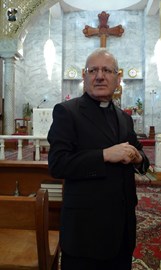|
Iraq--what future for Christians? "Christians and Muslims should not give up on raising their voices against the extremists and should work together to create a new mentality of living together in peace and harmony." For almost two millennia Christian communities have lived in Iraq, Syria, Egypt and elsewhere in the Middle East. These groups have contributed economically, politically, and intellectually, and have helped shape their respective cultures. Unfortunately, in the 21st century Middle Eastern Christians are being severely persecuted. When they have the means, many are fleeing the region. It
has become obvious that Iraqi Christians along with other minorities have
received a fatal blow at the heart of their lives and their existence when more
than a hundred and twenty thousand Christians were forced to flee from their
houses and villages, when their possessions of a lifetime, valuables and
documents were looted and when their houses were occupied: all these, just for being Christian! Displacement and Emigration have their great impact on us, on both Christians and Muslims. Iraq is losing an irreplaceable component of its society, the Christian one; hence a genuine and ancient tradition is endangered! The international community due to their moral and historic responsibility towards Iraq cannot be indifferent. It is also sad to say that the response of the international Muslim community towards the barbaric acts committed (in the name of their religion) against the life, dignity and freedom of Christians is not up to our expectations, considering the fact that Christians have contributed and fought for this country, living in partnership with their Muslim brothers alongside the Islamic civilization (sharing their sufferings and their joys). Religious fundamentalism is still growing in power and force, provoking tragedies, and making us wonder when the Islamic religious scholars and the Muslim intellectuals will critically examine this dangerous phenomenon and eradicate it by educating a true religious consciousness and spreading an authentic culture of accepting the people of other faiths as brothers and as citizens with equal and full rights. ISIS is moving forward with its ferocious war against culture and diversity, and thus threatening the intellectual and social fabric of the entire society. Christians and Muslims should not give up on raising their voices against the extremists and should work together to create a new mentality of living together in peace and harmony. Therefore it is high time that an effective action has to be undertaken at the ideological level within the Islamic world to stop the claim of these extremists of their religious legitimacy for receiving resources and for recruiting new militants. We urge all religious and political leaders to spread the culture of openness, diversity, plurality and equality in the face of a culture of extremism, elimination, marginalization and social backwardness supported by a weak individual and collective consciousness of its own deficiency. Only education can commence this transformation and build a society where equality amongst citizens succeeds. This can be achieved primarily by revising accordingly the curriculum of all centers of learning, especially centers of religious education. To guarantee a better coexistence it is imperative to create a civil society that respects every religion and does not politicize religions for its own benefits. The title of this meeting 100 years after the World War I is “Religions and Cultures in Dialogue” for the sake of more peace in the future. This should be our way of life. So I suggest some practical points.
An updating of the religious vocabulary and a reform of the programs of religious teaching is crucial. Transformation and renewal is part of nature. Culture is evolving, mentalities are being refined, and languages are developing. We should seek a new method to think and exist in a spirit of “mercy and in service of love” (cfr.Ut Unum Sint, 92-93, 95) instead of having recourse to excuses to justify the current situation. Religions should seek a new human and theological language which speaks and touches the heart of persons and gives their life a direction and a hope instead of being instruments of violence for the benefits of a few. I invite our Muslim friends in the Middle East to bring a common action to “a Common Word.”
Finally: Let us Christians, Muslims and Yezides stop the logic of conflicts and violence and replace it with the logic of dialogue and peace, then we all will have future. I do believe that the solution for our problems is a federal regime which can keep the unity of the country and can help. We have only 6 months left before winter so please we urge you: 1- To liberate not only the plain of Nineveh, but also Mosul. 2- To support the safe return of the displaced population to their homes. 3- To help to immediately reestablish water and electricity and other services.
His Beatitude Patriarch Louis Raphael Sako, head of the Chaldean Church, delivered this talk in Antwerp, Belgium, at a conference organized by the Sant’Egidio community. |
|
|

